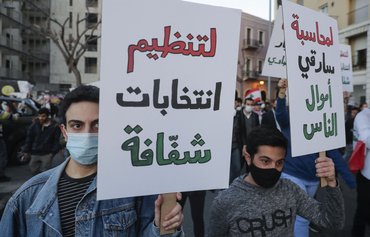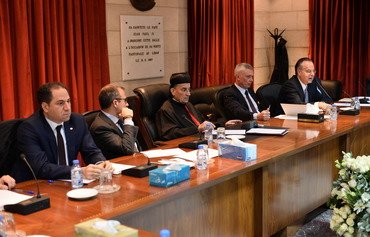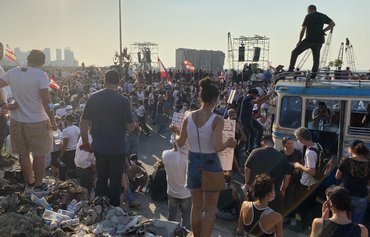A new political party in Lebanon seeks to harness the momentum gained by the ongoing protests to advance the economy, establish social justice and a state that alone is capable of protecting its borders and people.
A crop of political formations have sprouted since Lebanese citizens from across the political spectrum took to the streets last October to demand an end to the corrupt system and the dominance of Hizbullah.
Taqaddom (Progress) describes itself as a progressive democratic party working for social justice and sustainable development. Established as a non-ideological political platform by activists, it seeks to bring together different factions.
It is a different type of Lebanese political party "because it applies democracy to its own processes", party co-founder Marc Daou told Al-Mashareq.
The party was established in order to push for "engagement in institutional work, beyond protesting in the streets, by building a political organisation capable of competing with political forces controlling the state", he said.
Additionally, Taqaddom constitutes "a real popular political force capable of fighting the illegal presence of weapons", he said.
Iran-backed Hizbullah is the only Lebanese non-state armed group not to have disarmed after the country's 1975-1990 civil war.
There have been repeated calls for the militia to disarm, and to disengage from foreign conflicts such as the Syrian war, where it has been fighting on the side of the Syrian regime in breach of Lebanon's policy of dissociation.
The energy of activists, along with national and regional developments, "presents a real opportunity to bring about serious change in the Lebanese system and hold ruling authorities accountable", Daou said.
Lebanese people paid the price
"The establishment of political parties and blocs to ensure that new and alternative ideas and initiatives are put forth is part of real democratic political life," said Beirut-based journalist Diana Moukalled.
Since the end of the civil war, Lebanese politics has been restricted to powerful ruling parties, she told Al-Mashareq.
"The Lebanese people have paid heavy prices because of the abject failure of the post-war experience and the political structure that is based on quotas, clientelism, and of course, weapons," she added.
"The enrichment of civil political life comes in various forms, including the launch of political groups and formations that put forward programmes, engage people and try to put forth initiatives and solutions," Moukalled said.
The discussion and dialogue sessions that took place in the protest squares on a daily basis have facilitated the formation of political movements "as they were an outlet for many people to listen, discuss and put forward ideas", she said.
The time has come to organise the protest movement to facilitate action, she added, "and thus produce different faces and leaders with a promising [way of] thinking".
New political entities can lay an important foundation for effecting change in the longer term, Beirut Arab University political sciences professor Sana Hammoudi told Al-Mashareq.
But she cautioned that "a newly established party that proposes new ideas cannot bring about quick change in the status quo in Lebanon".
Achieving reforms and combating corruption in Lebanon requires "tremendous pressure that [activists] do not have at this time", she said, attributing this to the prevailing sectarianism that those in power exploit.

![Lebanese protestors take to the streets in Beirut on April 21st in a car convoy to protest against deteriorating living conditions and maintain pressure on a political elite under fire since mass protests erupted in October. [Ibrahim Amro/AFP]](/cnmi_am/images/2020/09/25/26257-Lebanese-protesters-Beirut-600_384.jpg)






